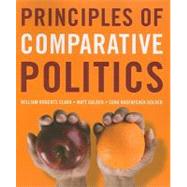
| Preface | |
| List of Tables, Figures, and Boxes | |
| List of Maps | |
| Introduction | |
| Overview of the Book | |
| The Approach of this Book | |
| Key Concepts | |
| What is Science? | |
| Introduction | |
| The Comparative Method | |
| An Introduction to Logic | |
| Science and Falsificationism | |
| Conclusion | |
| Key Concepts | |
| Exercises | |
| What is Politics? | |
| The Exit, Voice and Loyalty Game | |
| Solving the Exit, Voice, and Loyalty Game | |
| Evaluating the Exit, Voice and Loyalty Game | |
| Conclusion | |
| Key Concepts | |
| Exercises | |
| The Origins of the Modern State | |
| What is a State? | |
| The Contractarian View of the State | |
| The Predatory View of the State | |
| Conclusion | |
| Key Concepts | |
| Exercises | |
| Conceptualizing and Measuring Democracy | |
| Democracy and Dictatorship in Historical Perspective | |
| Classifying Democracies and Dictatorships | |
| Conclusion | |
| Key Concepts | |
| Exercises | |
| The Economic Determinants of Democracy | |
| Classic Modernization Theory | |
| a Variant of Modernization Theory | |
| Some More Empirical Evidence | |
| Conclusion | |
| Key Concepts | |
| Exercises | |
| Cultural Determinants of Democracy | |
| Classical Cultural Arguments: Mill and Montesquieu | |
| Does Democracy Require a Civic Culture? | |
| Religion and Democracy | |
| Experiments and Culture | |
| Conclusion | |
| Key Concepts | |
| Exercises | |
| Democratic Transitions | |
| Bottom-Up Transitions to Democracy | |
| Top-Down Transitions to Democracy | |
| Conclusion | |
| Key Concepts | |
| Exercises | |
| Does Democracy Make a Difference? | |
| Introduction | |
| The Effect of Regime Type on Government Performance | |
| Selectorate Theory | |
| Conclusion | |
| Key Concepts | |
| Exercises | |
| Group Decision-Making and Democracy | |
| Condorcet's Paradox | |
| Median Voter Theorem | |
| Arrow's Theorem | |
| Varieties of Democratic Institutions | |
| Key Concepts | |
| Exercises | |
| Parliamentary, Presidential, and Mixed Democracies: Making and Breaking Governments | |
| Introduction | |
| Classifying Parliamentary, Presidential, and Mixed Democracies | |
| Making and Breaking Governments: Parliamentary Democracies | |
| Making and Breaking Governments: Presidential Democracies | |
| Making and Breaking Governments: Mixed Democracies | |
| Conclusion | |
| Key Concepts | |
| Exercises | |
| Elections and Electoral Systems | |
| Introduction | |
| Elections: An Overview | |
| Proportional Electoral Systems | |
| Mixed Electoral Systems | |
| An Overview of Electoral Systems around the World | |
| Conclusion | |
| Key Concepts | |
| Exercises | |
| Social Cleavages and Party Systems | |
| Political Parties: What are they and what do | |
| Party Systems | |
| Where do Parties Come From? | |
| Types of Parties: Social Cleavages and Political Identity Formation | |
| Number of Parties: DuvergerâÇÖs Theory | |
| Conclusion | |
| Institutional Veto Players | |
| Federalism | |
| Bicameralism | |
| Judicial Review | |
| Veto Player Theory | |
| Conclusion | |
| Key Concepts | |
| Exercises | |
| The Effect of Varieties of Democracy | |
| Representation | |
| Economic Performance | |
| Ethnic Conflict | |
| Democratic Survival | |
| Conclusion | |
| Key Concepts | |
| Exercises | |
| Bibliography | |
| Glossary | |
| Appendix | |
| Index | |
| Table of Contents provided by Publisher. All Rights Reserved. |
The New copy of this book will include any supplemental materials advertised. Please check the title of the book to determine if it should include any access cards, study guides, lab manuals, CDs, etc.
The Used, Rental and eBook copies of this book are not guaranteed to include any supplemental materials. Typically, only the book itself is included. This is true even if the title states it includes any access cards, study guides, lab manuals, CDs, etc.